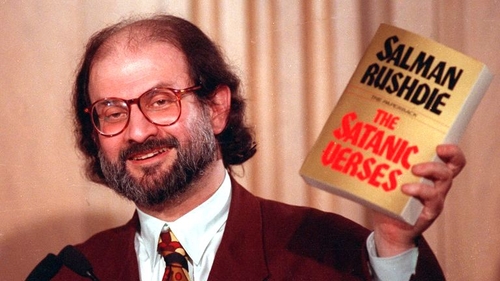Powerline: You published The Rushdie Affair in 1990 and now see your assessment of the seriousness of the edict confirmed in the attempted assassination of Salman Rushdie. Can you comment for us now in retrospect?
Daniel Pipes: It surprised me how, already in 1990, Rushdie thought he could leave the edict behind by saying what he imagined his tormentors wished to hear. They saw through his lies and never gave up the campaign, until one day a willing executioner turned up. A psychological explanation probably accounts for Rushdie's willful self-delusion.
 Salman Rushdie and The Satanic Verses. |
Powerline: There appears to be some question whether Ayatollah Khomeini's "fatwa" condemning Rushdie and his publishers to death was in fact a fatwa. Can you clarify?
Daniel Pipes: In addition to the technical point that a fatwa must be in response to a question, which the Rushdie death sentence was not, Twelver Shi'i Islam as practiced in Iran distinguishes between two types of religious pronouncements, a fatwa and a hukm. A fatwa holds during the lifetime of the mufti who issues it whereas a hukm remains valid after his death. Iranian spokesmen unanimously consider the sentence on Rushdie to be a hukm. Rather than get caught up in the technicalities of Islamic law, I call Khomeini's pronouncement an edict.
Powerline: You persistently documented the vagaries of Rushdie's reaction to the edict and occasionally faulted him for not taking it seriously. What was the point you were making?
Daniel Pipes: I kept warning him, six times in all between 1990 and 2007, to take the death edict seriously and not to fool himself into thinking he was safe just because he had not yet been attacked. He not only ignored me but prompted his friend, the writer Christopher Hitchens, to ridicule me.
Powerline: Insofar as the attempted assassination took place on American soil as Rushdie at a venue where Rushdie was about to speak up for free speech, I find this incident a humiliating abomination for the United States. Do you too?
Daniel Pipes: Not really. Rushdie chose to live in the United States and he refused security when it was offered him, so I don't see that Americans or their government should feel guilty or humiliated. This incident does point, however, to the need for much more care about who enters the country. I have worked out a test to separate regular Muslims from Islamists that, needless to say, is not in use.
Powerline: At the same time the Iranian regime is seeking to assassinate former American officials including John Bolton and Mike Pompeo. What do you make of the Biden administration's pallid reaction to the ongoing efforts?
Daniel Pipes: Biden and his aides are dead set on reaching a new Iran nuclear deal and, apparently, will not be deterred by something so petty as attempted murders on American soil.
Powerline: Can you comment on the Biden administration's continuing efforts to wrap up another nuclear deal that with the Iranian regime?
Daniel Pipes: Like Barack Obama before him, Joe Biden believes that being nice, making concessions, and appeasing the mullahs in Tehran is the way to conduce them to better behavior. This approach worked brilliantly with Hitler, Brezhnev, and Arafat, so why not try it again?
Aug. 19, 2022 update: For more detail on how, "already in 1990, Rushdie thought he could leave the edict behind," see "Salman Rushdie Was Never Safe."
